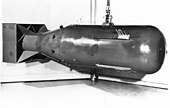| Nuclear weapons |
|---|
 |
| Background |
| Nuclear-armed states |
|
In nuclear ethics and deterrence theory, no first use (NFU) refers to a type of pledge or policy wherein a nuclear power formally refrains from the use of nuclear weapons or other weapons of mass destruction (WMD) in warfare, except for as a second strike in retaliation to an attack by an enemy power using WMD. Such a pledge would allow for a unique state of affairs in which a given nuclear power can be engaged in a conflict of conventional weaponry while it formally forswears any of the strategic advantages of nuclear weapons, provided the enemy power does not possess or utilize any such weapons of their own. The concept is primarily invoked in reference to nuclear mutually assured destruction but has also been applied to chemical and biological warfare, as is the case of the official WMD policy of India.[1][2]
China and India are currently the only two nuclear powers to formally maintain a no first use policy, adopting pledges in 1964 and 1998 respectively. Both NATO and a number of its member states have repeatedly rejected calls for adopting a NFU policy,[3] as during the lifetime of the Soviet Union a pre-emptive nuclear strike was commonly argued as a key option to afford NATO a credible nuclear deterrent, compensating for the overwhelming conventional weapon superiority enjoyed by the Soviet Army in Eurasia.[4][5] In 1993, Russia dropped a pledge against first use of nuclear weapons made in 1982 by Leonid Brezhnev,[6] with Russian military doctrine later stating in 2000 that Russia reserves the right to use nuclear weapons "in response to a large-scale conventional aggression".[7] Pakistan has also made similar statements, largely in reference to intermittent military tensions with India. North Korea has publicly pledged to refrain from a preemptive nuclear strike, while threatening retaliation up to and including WMD against conventional aggression.
- ^ "India's Response to CBW attack". Manohar Parrikar Institute for Defence Studies and Analyses.
- ^ Sundaram, Kumar; Ramana, M.V. (2018). "India and the Policy of No First Use of Nuclear Weapons". Journal for Peace and Nuclear Disarmament. 1: 152–168. doi:10.1080/25751654.2018.1438737.
- ^ Mendelsohn, Jack (July–August 1999). "NATO's Nuclear Weapons: The Rationale for 'No First Use'". Arms Control Association.
- ^ Chang, Gordon (July 27, 2016). "Declaring a no-first-use nuclear policy would be exceedingly risky". Bulletin of the Atomic Scientists. Archived from the original on July 28, 2016. Retrieved January 24, 2018.
- ^ Tierney, Dominic. "Refusing to Nuke First Is for the Powerful". The Atlantic. Retrieved 2018-01-24.
- ^ Schmemann, Serge (November 4, 1993). "Russia Drops Pledge of No First Use of Atom Arms". The New York Times. Retrieved 2 January 2012.
- ^ No First Use of Nuclear Weapons meeting: paper by Yuri Fedorov, 'Russia's Doctrine on the Use of Nuclear Weapons' Archived December 4, 2008, at the Wayback Machine – Pugwash Meeting no. 279 London, UK, 15–17 November 2002